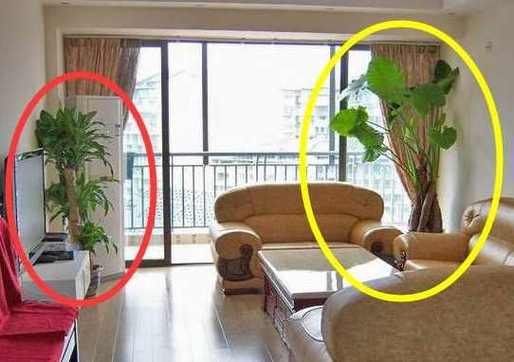卧室植物摆放风水禁忌,卧室摆放植物是否有利于健康
1、卧室植物放置风水禁忌
卧室植物放置风水禁忌
1. 避免带刺或有毒植物
带刺的植物,如仙人掌和玫瑰,很容易引起对错和争吵。夹竹桃、滴水观音等有毒植物可释放有害气体,损害健康。
2. 植物不宜放置过多
卧室空间有限,过多的植物会消耗过多的氧气,导致空气质量下降,影响睡眠。
3. 避免阴生植物
阴生植物一般喜欢阴,在卧室光线不足的环境中容易枯萎。阴气过于旺盛会使人抑郁。
4. 放置枯萎的植物是禁忌
枯萎的植物不仅影响美观,还意味着衰落和不吉利。应及时更换或移除。
5. 不能放在床头
植物释放的二氧化碳和其他气体会影响呼吸,因此不应放置在床头。
6. 避免五行相克的植物
根据五行相生相克的原则,卧室植物的五行属性应与主人的五行相生,避免摆放五行相克的植物。
7. 风水植物不宜放置
如万年青、龙骨、白掌等风水植物,虽有招财化煞的作用,但在卧室里却容易扰乱气场,影响睡眠。
8. 植物不宜遮挡光线
植物摆放要适当,不要遮挡卧室的采光,否则会使卧室阴暗,不利于健康。
9. 避免植物面对床
植物会对床形成冲煞,影响睡眠质量。
10. 注意植物的净化能力
将绿萝卜、吊兰、虎皮兰等具有净化空气能力的植物放在卧室里,能吸收有害气体,营造健康的环境。
2、卧室里的植物对健康有好处吗?
卧室放置植物对健康的影响
好处:
改善空气质量:有些植物能吸收空气中的毒素,如甲醛和苯,从而净化空气。
增加湿度:植物可以通过蒸腾释放水分,从而增加卧室的湿度,缓解干燥。
促进睡眠:一些植物,如薰衣草和缬草,有助于缓解和镇静睡眠。
减压:一些植物已被证明具有减压和改善情绪的作用。
提升美感:植物能增添色彩和活力,提升卧室的美感,营造更加温馨舒适的空间。
风险:
过敏:有些植物可能会引起过敏反应,尤其是对花粉或植物汁敏感的人。
真菌生长:浇水过多或湿度过高会导致植物周围形成真菌,释放孢子进入空气,可能导致呼吸道问题。
夜间消耗氧气:有些植物在夜间消耗氧气,这可能会导致卧室氧气水平下降。
建议:
选择合适的植物:选择能净化空气、促进睡眠、减轻压力的植物。
避免使用有毒植物:避免使用龟背竹、天堂鸟、夹竹桃等有毒植物。
控制湿度:保持卧室湿度在4060%之间,避免真菌生长。
避免夜间耗氧的植物:避免夜间耗氧的植物,如芦荟、兰花、虎皮兰等。
及时清洁:定期清洁植物叶片,清除灰尘和死叶,避免真菌和花粉堆积。
结论:
把植物放在卧室里可以提供各种健康好处,但要注意潜在的风险。仔细选择植物,控制湿度,保持植物清洁,可以利用植物的好处,避免不良影响。
3、卧室植物的风水禁忌是什么?

卧室植物放置风水禁忌
避免放置有刺或有毒的植物:它们会释放负能量,影响睡眠质量。例如,仙人掌、夹竹桃、虎皮兰等。
不要放太多的植物:太多的植物会产生太多的二氧化碳,影响空气质量,不利于睡眠。
避免放置会释放强烈气味的植物:如百合、茉莉等,它们的香气过浓,会干扰睡眠。
藤蔓植物不宜放置:藤蔓植物会缠绕,象征纠缠不清,不利于夫妻感情和谐。
床头正上方不要放置植物:床头正上方放置植物会产生压迫感,影响睡眠。
避免放置大型植物:大型植物会阻挡光线和空气循环,造成黑暗潮湿的环境,不利于健康。
开花期间的植物不宜放置:开花期间的植物会释放花粉,对花粉过敏者会造成健康问题。
阴性植物不宜放置:如吊兰、万年青等,这些植物阴气较重,会影响阳气流通,不利于阳气旺盛的卧室环境。
注意植物的位置:将植物放在阳台或窗户上,以获得阳光和新鲜空气。
避免放置枯萎或病变的植物:枯萎或病变的植物会释放负能量,影响风水。
卧室植物适宜摆放:
绿萝
虎尾兰
吊兰
虎皮兰
白掌
富贵竹
文竹
绿萝
薄荷
4、卧室植物放置风水禁忌图片
List of Bedroom Plant Feng Shui Taboos with Images
1. Avoid thorny plants. They create a negative atmosphere and should be kept out of the bedroom.
[Image of a bed with a thorny plant on the bedside table]
2. Avoid plants with sharp leaves. They can create a sense of tension and anxiety.
[Image of a bed with a plant with sharp leaves on the bedside table]
3. Avoid plants with large leaves. They can block the flow of energy and make the room feel cramped.
[Image of a bed with a plant with large leaves on the bedside table]
4. Avoid plants with dark or poisonous flowers. They can create a negative atmosphere and make the room feel heavy.
[Image of a bed with a plant with dark or poisonous flowers on the bedside table]
5. Avoid plants that are too high or too low. They can create a sense of imbalance and make the room feel uncomfortable.
[Image of a bed with a plant that is too high on the bedside table]
[Image of a bed with a plant that is too low on the bedside table]
6. Avoid plants that are too fragrant. They can be distracting and make it difficult to sleep.
[Image of a bed with a plant that is too fragrant in the bedroom]
7. Avoid plants that are too thirsty. They will require a lot of attention, which can be a distraction in the bedroom.
[Image of a bed with a plant that is too thirsty in the bedroom]
8. Avoid plants that are too messy. They can create a cluttered atmosphere and make the room feel untidy.
[Image of a bed with a plant that is too messy in the bedroom]
9. Avoid plants that are too expensive. If a plant dies or gets damaged, it can be a financial burden.
[Image of a bed with a plant that is too expensive in the bedroom]
10. Avoid plants that are associated with bad memories. They can create a negative atmosphere and make it difficult to sleep.
[Image of a bed with a plant that is associated with bad memories in the bedroom]
起名大全
最近更新
- 八字
- 吉日
- 起名
- 节气

















